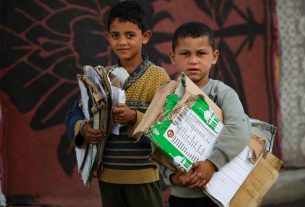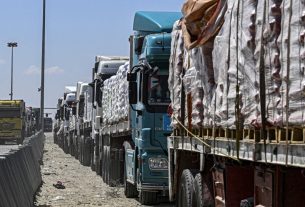Boko Haram Founder’s Son Arrested in Chad
Authorities in Chad have arrested Muslim Yusuf, the teenage son of Boko Haram’s late founder, Mohammed Yusuf. He was apprehended while allegedly attempting to establish a jihadist cell affiliated with the Islamic State West Africa Province (ISWAP) in the Lake Chad region. Yusuf, who initially disguised himself under the alias Mustapha Bana Abubakar, was captured alongside five others.
The arrest was confirmed by Chadian police, although identities were initially withheld. Nigerian intelligence, operating through the Multinational Joint Task Force (MNJTF), later disclosed his true identity. Security sources indicated Yusuf was seeking to gain recognition within ISWAP by forming his own faction. Boko Haram and ISWAP have remained active in the region despite multinational efforts to contain them.
Katsina Mosque Attack: Gunmen Kill Worshippers in Reprisal Raid
At least 17 worshippers were killed in an early morning attack on a mosque in Unguwan Mantau village, Katsina State, Nigeria. Local officials attribute the assault to a reprisal following the killing of several bandits by residents two days earlier. The gunmen opened fire during dawn prayers and remain at large.
Northwestern Nigeria continues to face rising insecurity linked to armed groups targeting communities for ransom, resource control, or revenge. Katsina State has deployed additional police and military units, reaffirming its support for community-led security initiatives.
Nigeria: Police Strengthen Security Infrastructure in Benue State
In response to escalating insecurity in Benue State, Nigeria’s Inspector-General of Police, Kayode Egbetokun, has approved the creation of two new area commands and upgraded five police stations to divisional status. The restructuring aims to close security gaps across vulnerable rural areas and address conflicts between farmers and herders. Authorities praised state governor Hyacinth Alia’s support in enhancing operational capacity.
Motorcycle Militancy Reshaping Conflict Dynamics in the Sahel
Motorcycles have become central to the mobility and tactics of extremist groups in the Sahel, according to the Global Initiative Against Transnational Organized Crime. Armed actors, notably Jama’a Nusrat ul-Islam wa al-Muslimin (JNIM), exploit the terrain’s vastness and low population density to launch attacks with speed and surprise.
In early 2025 alone, JNIM-led attacks killed hundreds across Benin, Mali, Niger, and Burkina Faso. Governments have implemented widespread motorcycle bans, though such measures often harm civilian livelihoods more than combat insurgency.
Sudan: MSF Halts Services in Central Darfur after Hospital Attack
Médecins Sans Frontières (MSF) has suspended operations at Zalingei Hospital, Central Darfur, following a grenade attack that killed one and injured five others. The violence reportedly involved armed relatives of patients and occurred inside the emergency unit.
The hospital is the only referral facility for over 500,000 residents, currently grappling with a cholera outbreak. MSF’s withdrawal underscores the ongoing humanitarian crisis amid Sudan’s fragmented political and security landscape.
Somalia: Urban Displacement Exposes Governance Gaps in Mogadishu
Tens of thousands of internally displaced persons (IDPs) in informal settlements like Sinka Dheer, near Mogadishu, remain outside the formal jurisdiction of either the federal or state government. The lack of official recognition denies them access to public services, land rights, and political representation.
Clan dynamics and Al-Shabab’s ongoing insurgency complicate integration efforts. Nonetheless, some progress has been made with the recent formal incorporation of districts such as Garasbaley into Mogadishu’s governance framework.
South Sudan: President Appoints Daughter as Senior Envoy
President Salva Kiir has appointed his daughter, Adut Salva Kiir, as Senior Presidential Envoy for Special Programmes, raising concerns about political nepotism. Critics warn of a growing trend of “inheritance governance” in which political authority is transferred within elite families. Adut Kiir, who previously led a humanitarian foundation, assumes a high-level advisory role without prior government service.
South Sudan and Djibouti Agree on White Nile Trade Corridor
South Sudan and Djibouti have signed a landmark agreement to develop a trade corridor along the White Nile River. The project includes the construction of river and dry ports in South Sudanese towns such as Juba, Bor, and Malakal.
The initiative aims to enhance access to global markets for South Sudan and stimulate regional trade by connecting inland routes to Djibouti’s maritime infrastructure. Air cargo services and road-barge logistics form part of the corridor plan.
UN Secretary-General: ‘Africa Is Poised for Progress’
Speaking at the 9th Tokyo International Conference on African Development (TICAD), UN Secretary-General António Guterres reiterated calls for Africa to be granted a stronger voice in global governance. He advocated reforms of the UN Security Council and international financial systems, investment in digital infrastructure, and deeper regional integration.
Highlighting Africa’s young population and resource potential, Guterres emphasized the continent’s centrality to global sustainable development.
IGAD Launches 2026–2030 Strategy for Peace and Development
The Intergovernmental Authority on Development (IGAD) unveiled its 2026–2030 Strategic Plan in Kampala, focusing on climate resilience, sustainable agriculture, renewable energy, and food security. Lessons from the past five years, including conflict-related setbacks and donor fatigue, shaped the recalibrated strategy. The regional body aims to bolster economic integration and governance across the Horn of Africa.
Media Watchdogs Demand Release of Detained Ethiopian Journalists
Media freedom organizations are calling for the unconditional release of Ethiopian journalists Abdulsemed Mohamed and Yonas Amare. Both were detained under unclear circumstances earlier in August, prompting concerns about deteriorating press freedom in the country. Advocacy groups warn that the growing crackdown on journalists is stifling independent reporting and public accountability.
Africa Bitcoin Institute Launched to Tackle Digital Currency Gaps
The newly established Africa Bitcoin Institute aims to promote African-led research into cryptocurrency usage, financial inclusion, and digital rights. Spearheaded by Anaïse Kanimba, the initiative is supported by the Human Rights Foundation and MIT.
Bitcoin adoption in Africa is driven by inflation, cross-border payment inefficiencies, and economic instability. The institute seeks to center African realities in policy-making and global discourse around digital currencies.
Source: africacenter.org



